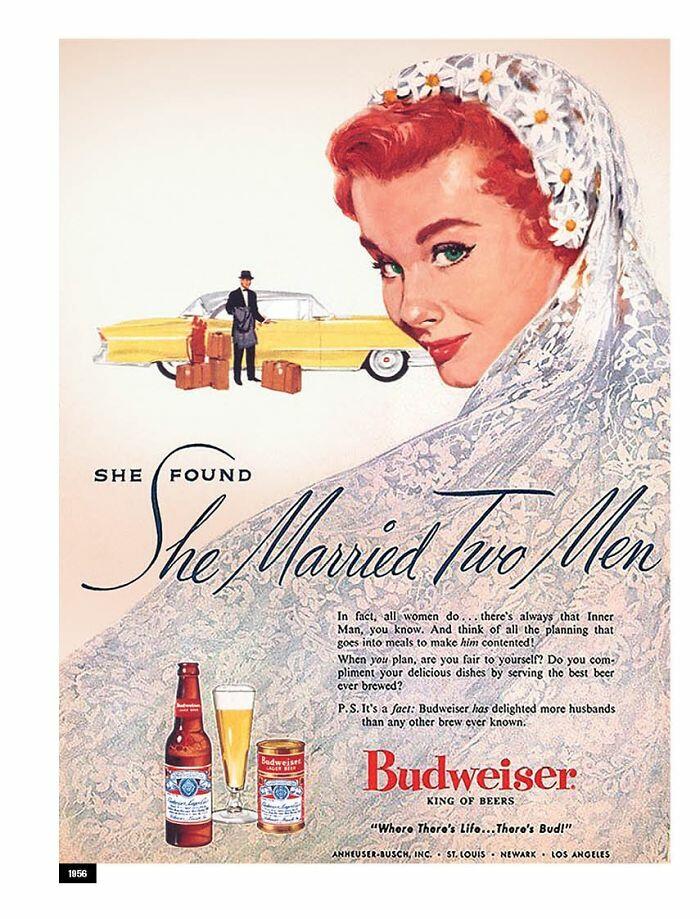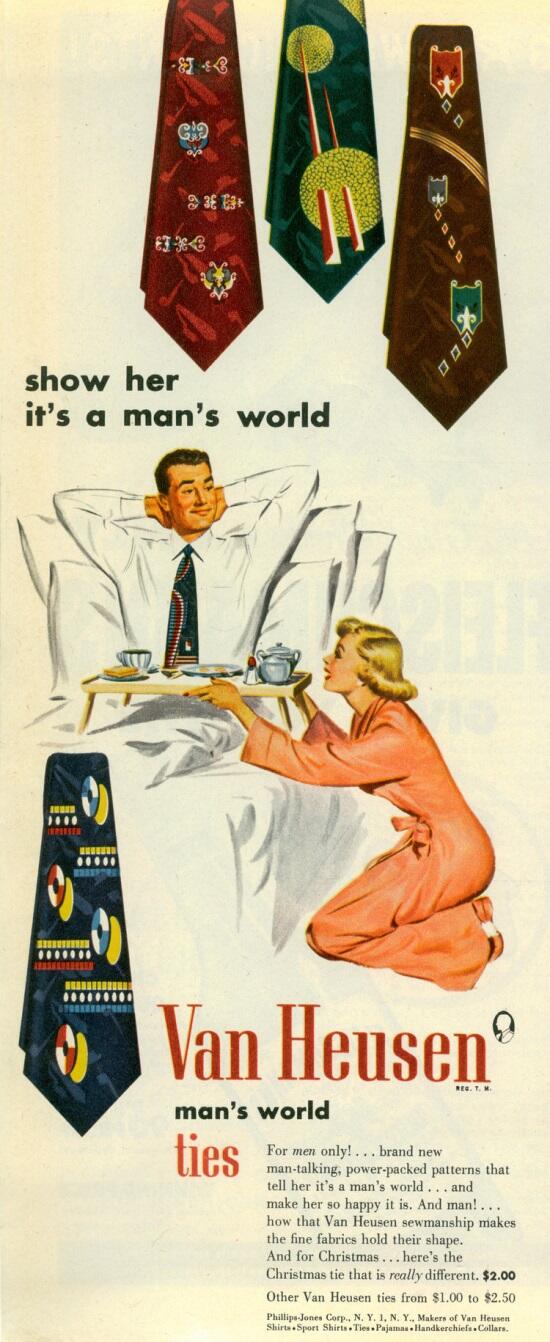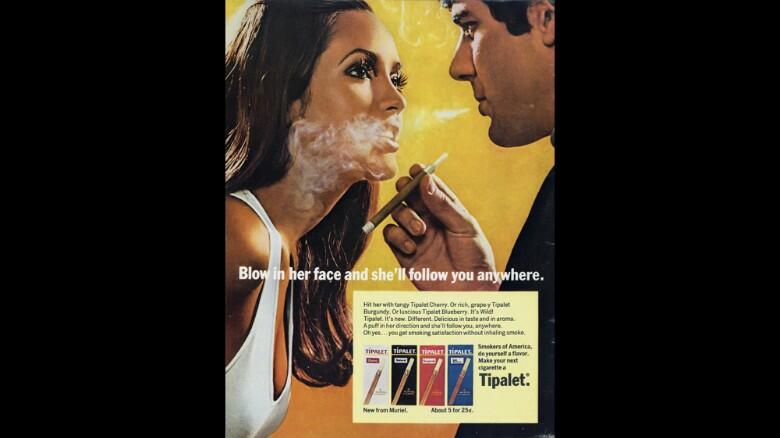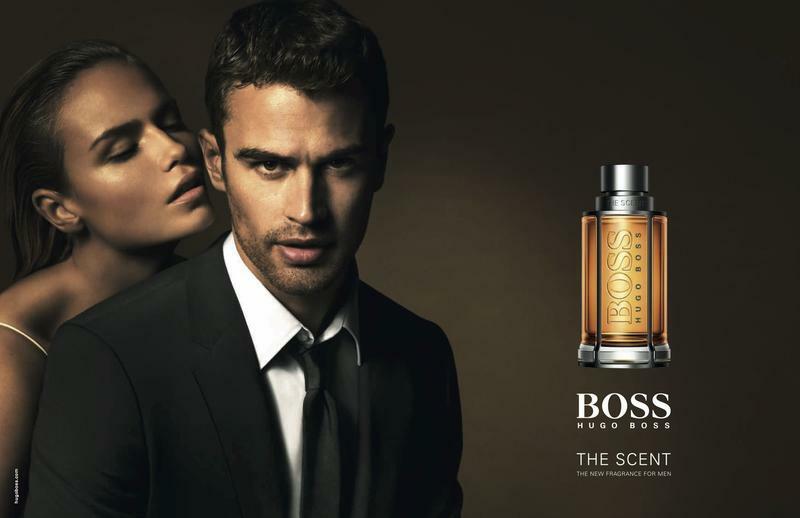Gender-oriented advertising campaigns are a natural phenomenon in the field of marketing, where specific trends form demand and reflect new social relationships. The images of males and females appearing as models of different products are often based on sexist ideas and are associated with stereotypes promoted to create a steady interest in certain products. The analysis of advertising materials with a detailed assessment of their background and purpose may help give examples of such an impact. This work aims to describe several gender-oriented images with their apparent overtones. An opportunity to influence consumer target groups through sexist advertising allows advertisers to create a reliable sales mechanism and promote specific products through a biased approach to the nature of genders.
Image of a Housewife
In the 50s of the last century, the Image of a housewife woman presented with obvious sexist overtones was standard in the advertising business. This trend was particularly relevant to products that were aimed at men as the primary target audience. The woman was introduced as the person who was to unquestioningly conduct housekeeping and maintain homeliness while, at the same time, allowing and encouraging the interests and tastes of the man. In Figure 1, a striking example of such a trend is depicted, where women are asked to pay attention to a famous beer brand as a mandatory product that should be present on the table.

This advertisement was aimed at selling one of the popular brands of beer in 1950s. This image is aimed directly at women, but it also affects the male audience, making it clear that wives are to recognize their husbands’ preferences and satisfy their tastes. The image of a beautiful and young woman was a successful marketing move that allowed attracting the attention of both sexes and presented the stated idea as a given and a profitable prospect. The advertising is sexist and conveys the mood of the era when the desires of males were more preferable that those of females. The slogan proves that wives were to take into account their husbands’ tastes. Thus, one of the solutions was to offer a man pleasure in the form of a delicious beer, which emphasizes how unequal genders were in the context of the social hierarchy.
Male Domination
Despite individual advertisers’ attempts to equalize both sexes in terms of equality and a unified approach to shopping, the trend of male dominance is still relevant. Many advertisements promote the image of men’s independence and influence as a key principle in attracting the attention of the target audience. Moreover, such a model of impact on consumers has always been of interest and served as a factor encouraging the purchase of specific goods. In Figure 2, a typical example is shown, where a man appears to be in a relaxed and confident state.

In this case, a man’s tie is advertised as an integral male fashion attribute of that era. This advertisement was created in the 1950s and was aimed at showing men that their success and dominance in the world was largely dependent on their appearance. An explicit image of a woman kneeling and serving coffee is evidence of a sexist marketing approach. The apparent dominance of the man in the picture attracts the target audience and serves as a confirmation of the widespread position of male power. Two people are present in the image, but the posture and gestures of the man indicate complete relaxation and confidence in his individual strength and significance. The advertising slogan also confirms the assumption and is a sexist appeal that degrades the dignity of women and a priori puts men higher in their social status, thereby proving the existing hierarchy of power. At that time, movements for equality were not widespread, which allowed marketers to utilize this principle of promoting men’s products and involve as many potential customers as possible.
Open Humiliation
Behind disguised sexism, open humiliation of personal dignity was evident in many advertisements of the last century. In particular, one of the cigarette brands offered an ambiguous image in which the dominant position of the man in relation to the woman was promoted. In Figure 3, this poster is presented, and its popularity is the reason to doubt the impartiality of marketers’ plan.

This advertisement offered one of the cigarette brands that were sold actively in the last century. Men were a key client segment, and the manifestation of the woman’s open humiliation was aimed at attracting males’ attention and satisfying their masculinity. The image is sexist, although the realities of that time are preserved, in particular, the widespread opportunities for men and their dominance. Blowing cigarette smoke into the woman’s face is not only unethical but also humiliating, which proves the assumption. An open call in the image testifies to social inequalities promoted in advertising and emphasizes male power over females.
Contemporary Social Hierarchy
When taking into account the aforementioned trend of male dominance, one can give an example of advertising that complements this social aspect and emphasizes the different possibilities of both genders in the modern world. A hierarchical principle that implies positioning men at the forefront is reflected in various promotional materials. In Figure 4, a sample of such advertising is presented as a prime example of power capabilities.

As a key element of the sale, this advertisement offers the men’s perfume of one of the famous brands. The proposal is focused exclusively on males, and it equally affects both socially successful and ordinary men. The image of a confident person is complemented by a woman in the background who cannot resist a new aroma. This model of promotion is often utilized in modern marketing, and such an approach reflects the social hierarchy unambiguously, where men occupy leading positions. Power opportunities complemented by a pleasant odor of the perfume are to strengthen male dominance. The key detail that leads to such a conclusion is the confident position of the man in the frame, who does not pay attention to the woman reaching for him. Accordingly, the elements of sexism may be traced in this advertisement, which can be considered the manifestation of social inequality.
Conclusion
Marketing approaches based on using sexist and gender-oriented images in modern advertising can contribute to high sales and impact on the target audience. The presented examples prove that existing social trends largely depend on how they are displayed on popular promotion sites. Men’s dominance, women’s obedience, as well open humiliation, confirm the significant influence of advertising. The hierarchical structure of society with its power opportunities may be traced on the example of widely oriented promotional materials.